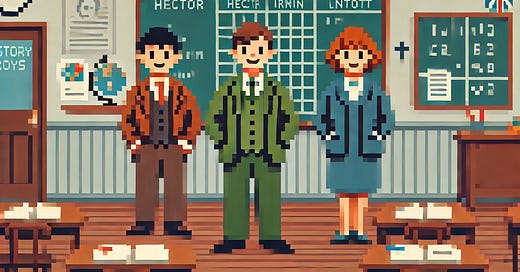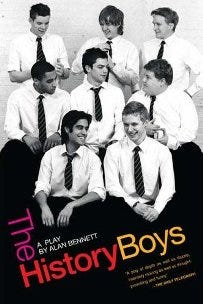Why waste money on overpriced leadership seminars when you could just binge-watch Netflix? Seriously, ditch those Simon Sinek YouTube and stream Alan Bennett's The History Boys. This British classic will teach you more about mentoring interns in one evening than ten management books filled with clichés about "unleashing potential" and "showing passion."
Famous playwright Alan Bennett wrote The History Boys in 2004, probably after enduring one leadership seminar too many. Set in the 1980s at a British grammar school, the story follows eight students being relentlessly drilled for entry into Oxford and Cambridge University. Think "Dead Poets Society" minus the sentimental speeches, emotional breakthroughs and Robin Williams, plus a heavy dose of brutally dry British sarcasm.
If you've ever doubted whether your education (or internship) had any point beyond "ticking the boxes," you'll feel painfully seen.
The History Boys gives us three completely different teachers, suspiciously similar to your average workplace mentors. One teacher inspires, one delivers results, and the third holds everything together when the others inevitably lose the plot.
Sound familiar?
Exactly, terrifyingly so.
Let’s explore them one by one:
1. Hector: the "Inspiration Guru"
Hector is that colleague who prefers discussing literature or difficult arthouse movies while the entire office burns down. Interns adore him: finally, someone who doesn't immediately launch into Excel sheets and "key takeaways." His style? Everything goes, nothing's required. Delightfully spontaneous, liberating, and hopelessly vague. Typical Hector wisdom: "Be yourself—unless you're boring. Then feel free to pretend to be someone else."He’s the mentor who gives you a quote from Churchill when you’re down, or a quirky analogy to spark your imagination. Sure, his approach is a bit chaotic and not immediately geared towards results, but it pays off in the long run by building passion and intellectual curiosity
In corporate terms, this is the “let them sit in on meetings” approach, otherwise known as osmosis learning; a strategy that assumes that if an intern spends enough time loitering near important people, they will somehow transform into fully functional professionals. It’s a beautiful theory. It’s also complete nonsense.
Why? Because most interns really crave structure. If you let the ‘Hectors’ handle everything, your intern will inevitably end up crying under the conference table in a fetal position, thumb in mouth, hopelessly lost in the dark woods of "self-discovery."
2. Irwin: the "Performance Coach"
That's where Irwin steps in. Irwin is young, strategic, and pretends everything is about results and clever tactics. He's the guy who coaches interns to deliver flashy presentations, preferably without substance. His core message: "Results trump facts."
With Irwin, you get immediate results: interns hit deadlines, master buzzwords, and emerge from meetings like they've just delivered a TED Talk. If Irwin ran an internship program, every intern would have a Trello board, a SMART goal, and a recurring check-in scheduled precisely every 2.5 weeks at Friday 11 sharp. But be careful because before you know it, you'll have an army of slick junior consultants in even slicker suits devoid of conscience (but armed with perfect slide decks).
3. Mrs. Lintott: the "Quiet Force"
Luckily, there's Mrs. Lintott, the teacher nobody remembers until disaster strikes. In The History Boys she’s the one who bluntly points out the boys’ antics and even delivers a bit of a feminist critique that leaves the overconfident men speechless. She's realistic, clear, and violently allergic to fluff. Her advice is straightforward and practical: "Don't email your boss 'Hey bro,' ever," and "Always back up your work because there are only two kinds of people: those who've lost data and those who will."
Always back up your work because there are only two kinds of people: those who've lost data and those who will."
Lintott is that colleague who explains to newcomers how the printer works, that you place your cup a little to the left in the coffeemachine and why it's best not to sit on that one particular office chair (you know the one). Her guidance might seem boring, but it's the only thing that genuinely works.
Balancing madness with wisdom
The best internship mentors, therefore, combine a bit of Hector, a dash of Irwin, and a heavy dose of Mrs. Lintott. They know when inspiration is needed, when performance is crucial, and when it's simply time to say, "Just do exactly as I tell you, and everything will be fine." Think of it like jazz improvisation: you might lead with a Hector riff ( a burst of inspiration) then follow with an Irwin hook to give it structure, all underscored by a steady Lintott bass line of practical advice. The mentorship “music” is most effective when these elements complement each other. Too much Hector and an intern might feel great but wander aimlessly; too much Irwin and they might hit targets while burning out creatively; ignoring Mrs. Lintott means they might miss out on fundamental skills (or basic office etiquette!). As one of the boys in The History Boys observes, it’s “all about variety, sir.”
It’s about balancing madness with wisdom.
Moral of the story
Just watch The History Boys. It won't make you a better person (thankfully) but it will show you exactly how mentoring really looks: messy, absurd, and borderline dysfunctional at times. Plus, there's a slim chance your intern might one day become your boss. Maybe they'll remember your brilliant mentorship and spare your job when AI robots inevitably take over. 🤷🏾





